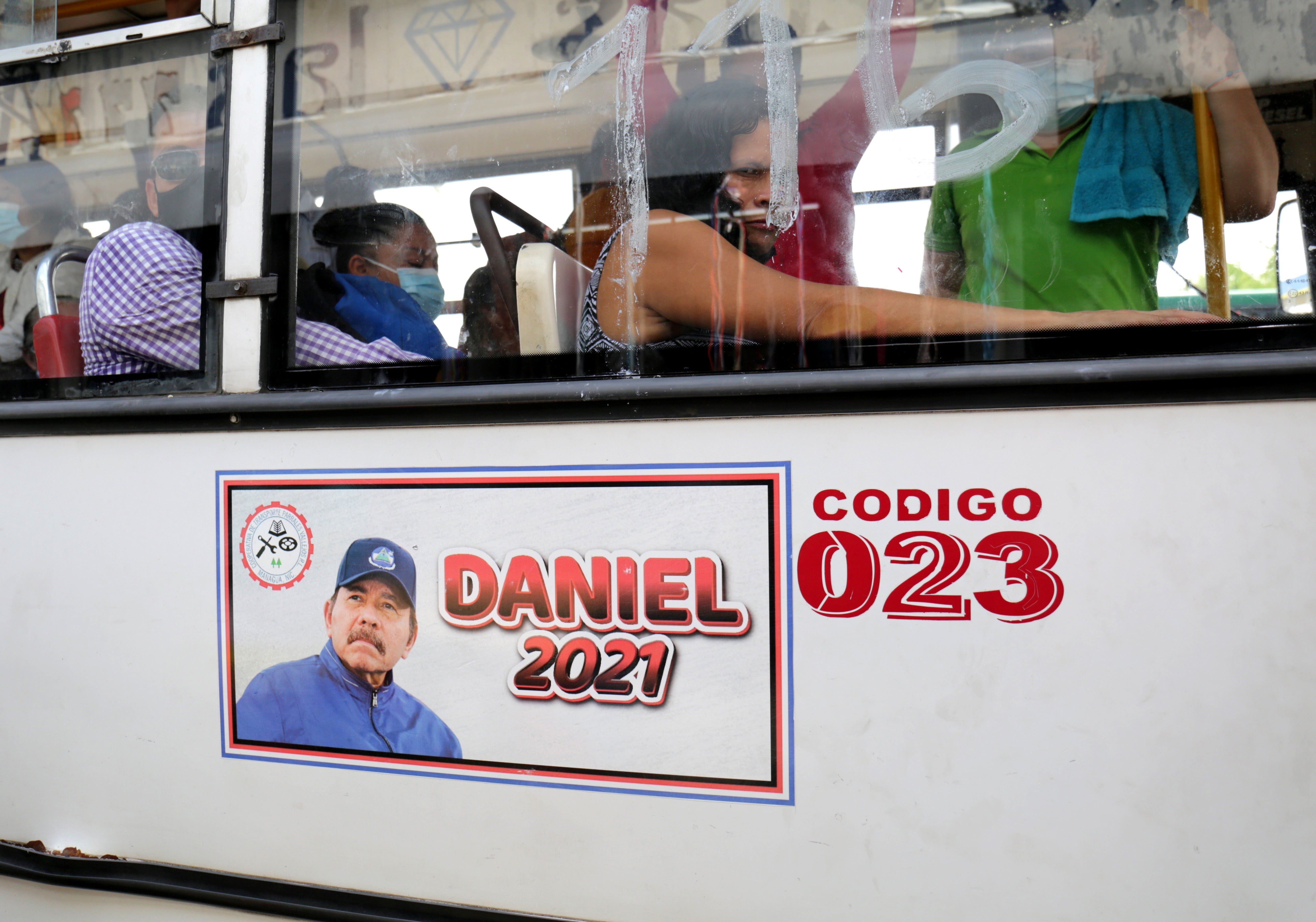As former hero Ortega plans to win the upcoming election, more Nicaraguans prepare to leave
Ortega’s repression in the run-up to the November election aims at decapitating any potential uprising, reports Ahmed Aboudouh


It was dark when French-Nicaraguan journalist Fabrice Le Lous felt three cars were following him that night. This was in the summer of 2018, shortly after the massive popular uprising that had shaken Nicaragua for months.
“I was with a fellow journalist colleague, and we were exiting La Prensa”, he recalled to The Independent, referring to Nicaraguan biggest newspaper.
By that time, more than 300 opponents of former revolutionary hero Daniel Ortega and his wife, Vice President Rosario Murillo, were thrown in jail when the protests over retirement reforms quickly became a national revolt.
This was a clear message Mr Le Lous understood very well. “That experience, plus the fact that I knew what was coming to the country, made me think of leaving. I came to Costa Rica in July since I also have Costa Rican nationality.”
Mr Le Lous is not alone. Official data shows the Costa Rican immigration system is under the threat of being overwhelmed by the biggest exodus since the 1980s civil war since security forces have arrested seven presidential bidders in June.
In total, the campaign included 37 high-profile activists, journalists and business people, most of them under a controversial treason law. The move was perhaps designed to assert Ortega’s authority ahead of the 7 November presidential election.
“Ortega has virtually beheaded the opposition,” Tiziano Breda, a Central America analyst at the International Crisis Group said.
Activists see a sign of weakness and a desire to maintain power at any cost.
Mr Breda agrees. The last wave of detentions “is meant to basically suppress even the slightest chance of being defeated in a competitive election and ensure his perpetuation in power,” he noted.
Ortega first took power after the 1979 overthrow of US-backed right-wing dictator Anastasio Somoza by Sandinista rebels but lost the 1990 election to Violeta Chamorro.
It took him almost two decades to return to office in 2007.
Since then, he and his wife have been busy expanding their family business empire while amending the constitution to remove any limits on their presidential terms and using controversial laws to subjugate independent media.
In August, Nicaraguan police have raided the offices of La Prensa, the highly critical newspaper where Mr Le Lous had worked before fleeing the country and accused it of “customs fraud and money laundering”.
“Since 2007, Nicaragua has only had one president. Whole generations of Nicaraguans have never known another head of state. To compare numbers, Guatemala has had six different presidents since 2007 whilst its other neighbours, El Salvador, Honduras, Panama and Costa Rica, have each had four,” Mr Le Lous recently wrote.
The Sandinista National Liberation Front (FSLN), Ortega’s ruling party, has been consolidating its grip on vital state institutions.
It is this long-term strategy, Mr Le Lous thinks, that would put Ortega on a victory path.
“Ortega has already won it by a landslide since his party controls every power,” he insists.
“Next 7 November will only be an exercise, a show that has to be fulfilled officially. But the results are in. The calendar is the only thing delaying the outcome.”
The FSLN formed cartel-like alliances with the national police and the army, propped up by the Sandinista radical paramilitary forces, to protect his regime.
The National Assembly, the judiciary and - crucially - the Supreme Electoral Council, were also put under Ortega’s total control as gatekeepers of oppressive laws and underwriters of his endless reign.
“The National Assembly passed the set of repressive laws now being used against opponents, and Ortega appointed new loyalists in the Supreme Electoral Council, which then ruled the main opposition parties illegal,” Mr Breda stated.
He says that “security forces (particularly the police) constantly harass opponents and have physically carried out the detentions, sometimes even without an arrest warrant from the Public Ministry.”
In June, ironically, the National Police has placed under house arrest Cristiana Chamorro, the daughter of Violeta Chamorro and a potentially serious contender in the November election.
This coordinated crackdown, Mr Breda says, reflects Ortega’s grip on all the main state branches, not as a result of it.
This also means many at the top of these institutions see backing Ortega’s bid to remain in power after more than a decade of effectively controlling them as a no brainer.
Fears also grip Ortega’s aids that an egregious orchestration of re-installing Ortega as president for another term could trigger unrest, similar to the 2018 upheaval.
The last intensive crackdown is perhaps another “necessary” measure, the thinking in Managua goes, to decollate any possible social uprising by locking up its potential leaders.
However, experts think the prospects of a second revolt within only three years remain wishful thinking for a splintered opposition that constantly failed to present a coordinated plan to oust Ortega.
The Nicaraguans are also exhausted by the economic fallout of Covid-19 in the second poorest country in the Americas.
In addition, the 2018 failed push for change overwhelmed young Nicaraguans with despair, as many of them came to think their country would never see democracy.
“I don’t think Nicaraguans will risk their lives again. During the uprising, for several months, people thought their actions were leading to foundational changes. But in the end, nothing changed,” Mr Le Lous stated bleakly.
Mr Breda thinks that many Nicaraguan’s might now believe they should prioritise building a future for their families abroad rather than fighting for change in their country.
“Facing the combination of political repression and grim humanitarian conditions, an ever greater number of Nicaraguans are choosing to flee the country, and Ortega’s one-sided re-election is likely to fuel the outflow,” he said.






Join our commenting forum
Join thought-provoking conversations, follow other Independent readers and see their replies
Comments